Quantum Sensing: Integrated Photonic Magnetometer with Squeezed Light
We're excited to work on this new NSF-funded project on quantum sensing with Prof. Caroline Ross at MIT!

In collaboration with Prof. Caroline Ross, scientist Paolo Pintus and Prof. Galan Moody will lead a new project to develop integrated photonic quantum magnetometers that use squeezed light to achieve sensitivity beyond the standard quantum limit.
From the NSF:
A new breed of sensors may one day allow doctors to pinpoint infections inside individual cells, or geologists to find subterranean mineral deposits without lifting a shovel. Bringing such innovations to fruition is the goal of 18 research teams backed by a $29 million investment from the U.S. National Science Foundation. The aim is to harness the infinitesimal — and sometimes counterintuitive — quantum-scale properties of nature to create new opportunities at the human scale.
The 18 teams are comprised of researchers at universities across the U.S. who competed for and won funding from NSF's Quantum Sensing Challenges for Transformational Advances in Quantum Systems program. Each team will receive $1 million-$2 million over four years to conduct research that uses quantum phenomena, such as entanglement (when some properties of two or more separate particles are invisibly linked), to create sensors which can do things that would otherwise be impossible. Collectively, the teams will conduct a broad range of exploratory research activities, from measuring the height and density of mountains with an ultraprecise atomic clock to revealing the inner functions of living cells with quantum-entangled particles of light.
"For decades, scientific exploration at the quantum scale has yielded surprising discoveries about how our universe works — and tantalizing possibilities for quantum-enabled technologies," says NSF Director Sethuraman Panchanathan. "We are now taking the next step in quantum research through these projects and others, which combine fundamental research with potential applications that can positively impact our lives, our economic prosperity and our competitiveness as a nation."
The new projects are part of NSF's broader strategy to realize the scientific and technological advances called for in 2018's "National Quantum Initiative Act" and, specifically, 2022's Bringing Quantum Sensors to Fruition report from the National Science and Technology Council.
The research teams include two located in states participating in NSF's Established Program to Stimulate Competitive Research (EPSCoR) which provides funding to areas in the U.S. which have historically received less federal funding for research than others. In addition to research-intensive universities, the teams also include one from an emerging research institution. All the teams will conduct education and outreach activities along with their research and development work. Those activities include K-12 programs with students and teachers, partnerships with local community colleges and other mentorship programs aimed at inspiring students to pursue a career in quantum-related science and engineering.